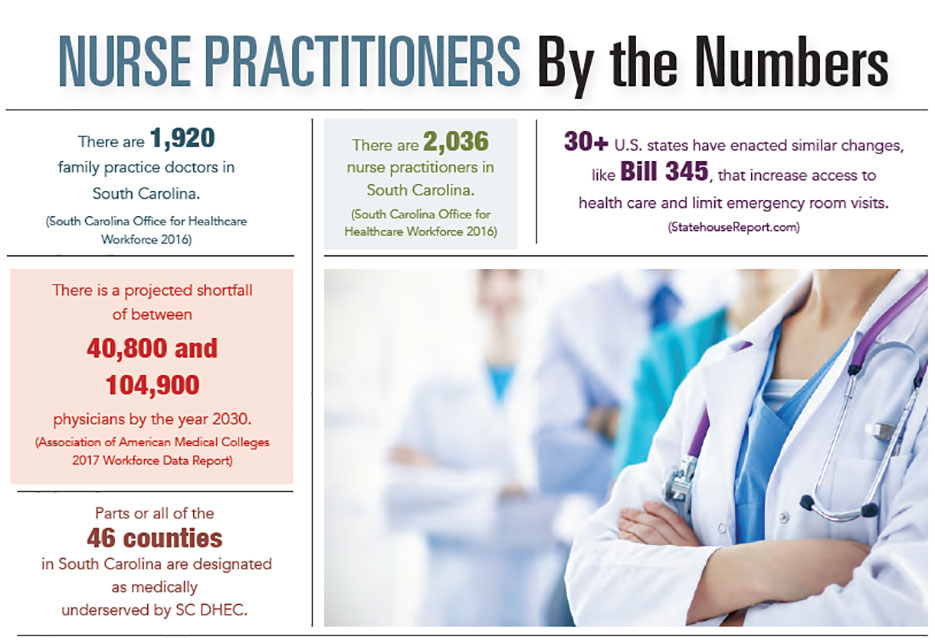It’s no secret that the population of the Lowcountry is growing; we see evidence of it daily in traffic, in new construction and in the overall cost of living. With an average of 34 people moving to the tri-county area daily and 11 new births each day, our infrastructure is struggling to keep up. The medical community is not immune to the problem, and, as our area continues to grow, many primary care providers are struggling to keep up with the influx of patients. A bill at the state level aims to lift some restrictions on nurse practitioners, which would in turn help accommodate the growing population.
“There is a shortage of primary care physicians. There are increasingly more patients than primary care providers to care for them,” said Tracy Caldwell, a nurse practitioner with MUSC Health Primary Care Sweetgrass in Mount Pleasant. “Research shows that nurse practitioners provide high-quality, cost-effective care, and, if Bill 345 passes, the relaxed limitations would allow nurse practitioners to further assist in filling this need.”
Under current law, a nurse practitioner must contract with a doctor, a “supervising physician” who is available for the nurse practitioner to consult when needed. However, a doctor is limited to supervising a maximum of three nurse practitioners. In addition, nurse practitioners must work within 45 miles of their supervising physician, making it complicated to help patients in rural areas of the state where there are few or even no primary care doctors.
Supporters of the bill say the current laws should be relaxed to give nurse practitioners a more conducive opportunity to practice. Some major changes would be to lift the geographical boundaries and remove the ratio restraint of nurse practitioners to supervising physicians, essentially making it easier for a nurse practitioner to find an available doctor to contract and consult with.
Nurse practitioners take a different educational path than doctors and are licensed under the State Board of Nursing rather than the Board of Medical Examiners. They are registered nurses who have obtained advanced education through master’s or doctoral programs. They do not go through a residency process like doctors, but they do clinicals, in which they work with an established nurse practitioner, physician or physician assistant in a primary care or specialty practice as part of their training. Upon completion of the program, nurse practitioners take an exam to become board-certified and must keep up their certification through continuing education and hours worked.
In fact, nurse practitioners do a lot of the same work that doctors do. As opposed to a registered nurse, who works under a doctor’s license and carries out the doctor’s orders, nurse practitioners work alongside physicians under their own license, seeing their own patients. They are allowed to prescribe all medications except Schedule II controlled substances like opioid pain medications and other narcotics that fall into this category.
“I prescribe medications for issues like anxiety, depression, high cholesterol, high blood pressure and diabetes,” Caldwell said. “I assess, diagnose, order testing, develop a treatment plan and follow up with my patients for both acute and chronic health conditions. I also make sure they are getting the needed preventative care like pap smears, mammograms, vaccines and colonoscopies.”
Aside from not being able to prescribe Schedule II substances, nurse practitioners are not allowed to sign handicapped placards or order diabetic shoes and can’t order home health, physical therapy or hospice care.
“The physicians I work with are great about helping me with those things, but it doesn’t make a lot of sense for me to have to get things like that approved and signed off on by doctors for patients they have not seen,” she explained. “Those are some of the things in the bill that they are trying to change.”
Those opposed to the bill are concerned that nurse practitioners lack the education and training of doctors, but Caldwell stressed that the bill is not designed to give nurse practitioners free reign to practice medicine or replace physicians. The bill simply aims to give nurse practitioner’s the ability to practice to the level of their education and training, which in turn will help patients where there is a need.
“There are times when I have a complicated or complex patient that I know is beyond my knowledge and expertise. In that situation, I consult or refer the patient to one of the physicians in my office or send them to a specialist. I’ve never worked with another nurse practitioner that doesn’t know their boundaries and comfort level in providing appropriate care. Our first priority is always patients and ensuring they are receiving the care that they need.”
By Anne Toole








